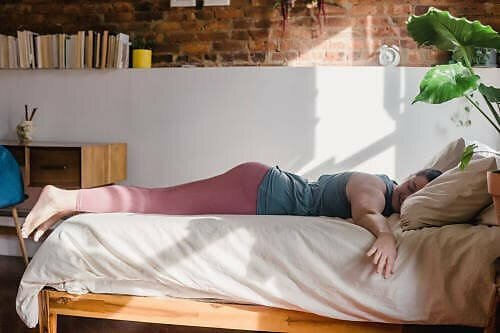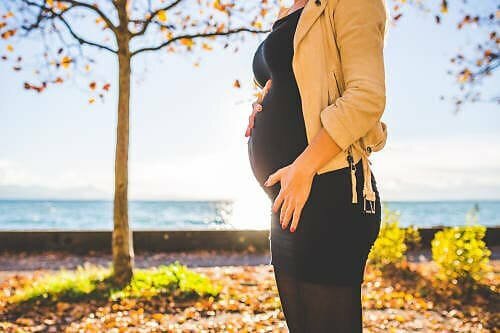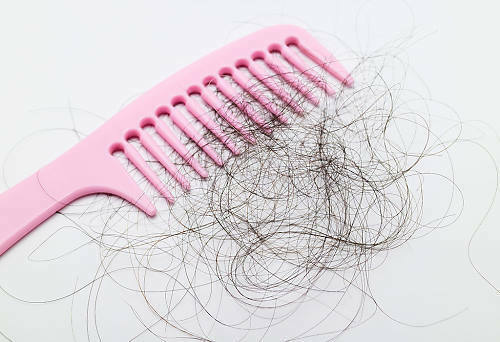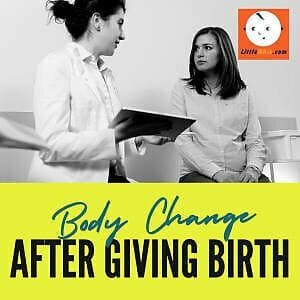Your body will change a lot during pregnancy, and it will begin changing once your baby is born.
Some of these changes are emotional (hello hormones! Some of these changes will be emotional (hello hormones!). However, others will be more physical. It is important to remember that giving birth can be a difficult experience for your body. Your body will need to heal and recover.
Talk to your GP if you have any concerns. Remember to go to your postnatal health screening, which takes place approximately six weeks after your baby’s birth.
Is Bleeding After Birth Normal?
[row]
[col span=”4″]
[/col]
[col span=”8″]
It is normal to experience bleeding after giving birth. This will feel like a heavy period. However, you might also notice that you have blood clots. This is known as lochia and it’s your body’s way of getting rid of excess blood and bodily fluids during pregnancy. It typically lasts about six weeks. However, it will become lighter over time.
You are also likely to experience some contractions or after-pains as your uterus shrinks back to normal size. These pains are similar to period discomforts. They can feel worse if you have ever had a baby and are often more intense if you are breastfeeding.
The area between your anus and vagina is known as the perineum. It can feel sore. It could be that you have had to repair or need stitches. Or it might just feel sore and uncomfortable.
[/col]
[/row]
It is normal for this to happen and will heal over time. If going to the toilet is uncomfortable, you may want to try a peri bottle or jug to pour warm water on the area while you urinate. This will reduce any burning or stinging sensations.
What Does It Feel Like When My Milk Arrives?
Your baby’s body will begin producing milk immediately after birth, regardless of whether you breastfeed or not.
When your baby is about two to four days old, you will notice your breasts feel fuller. Some people feel their breasts feeling hard and swollen when milk comes in.
You might notice your baby crying or thinking about your breasts leaking milk. Breast pads can be used to absorb the milk and prevent your clothes from getting wet.
Breastfeeding is a good option. You can feed your baby on demand and regularly, which will prevent your breasts from becoming fuller. It may take some time for your milk to dry out if you bottle feed, but this should be within 7-10 days.
You can express some relief by pumping or handing a little to loosen your breasts if they are feeling uncomfortable.
What Will My Hormones Do After I Give Birth?
After giving birth, your body’s levels of progesterone and estrogen will decrease dramatically. This can lead to what is commonly known as baby blues. You may feel weepy or anxious, and even irritable.
These mood changes can occur a few days after giving birth. They can be quite shocking after the excitement of meeting your baby. They usually disappear within one week, but if you’re concerned about how you feel, speak to your midwife.
Is It Normal For Women To Feel Tired After Giving Birth?
[row]
[col span=”4″]
[/col]
[col span=”6″]
No matter if you had a vaginal or c-section delivery, you will likely feel tired after giving birth. Be gentle with yourself, and try to get as much rest as possible. We understand that your baby may not allow you to sleep enough.
Low iron levels may explain why you feel so tired and shaky. Anemia is common in new mothers due to blood loss. It’s a good idea for your postnatal health to take iron-rich vitamin supplements.
To give your baby the energy and recovery it needs, eat a balanced, healthy diet.[/col]
[/row]
What Is The Reason I Omit To Urinate After Giving Birth?
You probably were told to do your pelvic floor exercises while you are pregnant, but regardless of whether you remember to do them, you should still try to strengthen these muscles after you give birth.
Vaginal deliveries can cause serious damage to your pelvic floor. Some women notice that they may leak a bit when they cough, laugh or make a sudden movement. This stress incontinence may cause you to need to wear maternity pads a bit longer.
You can continue with your pelvic floor exercises, but if you have a serious problem, talk to your doctor. They may be able to refer you to a specialist.
Also, it is common to feel constipated the first week after giving birth. To get things back on track, drink lots of water and eat plenty of fruits and vegetables.
If you have severe constipation or a perineal tear, you may be prescribed a gentle cleanse to loosen your stool.
Why Is My Stomach Still Looking Pregnant?
[row]
[col span=”5″]
[/col]
[col span=”7″]
Unfortunately, your bump will not disappear once you give birth. While your skin will feel softer, your bump will remain even though your uterus contract and your body eliminate excess fluid and blood.
Most pregnant women will have diastasis recti – a separation of the abdominal muscles but this gap will often close by itself in the first eight weeks after you give birth. It may look like you’re still pregnant, and your core muscles might feel weak.
Talk to your doctor if you have concerns. They may be able to recommend exercises that will help. Postnatal exercise specialists can help you create a program that will strengthen your abdominal muscles and not worsen the problem.
[/col]
[/row]
What Is The Reason I Am Losing My Hair After Having Children?
[row]
[col span=”5″]
[/col]
[col span=”7″]
Your hormone levels can cause you to have more hair when you’re pregnant. Your body will begin to shed this extra hair once you have given birth.
It can be alarming to find your hair on your pillow or see it coming out of your brush when you brush it. However, it is normal. However, your hair will probably feel thinner than it did before you became pregnant.
Postnatal hormones can cause skin changes. Both dry skin and acne can be normal, but they should both settle down once your hormone levels have stabilized.
[/col]
[/row]




